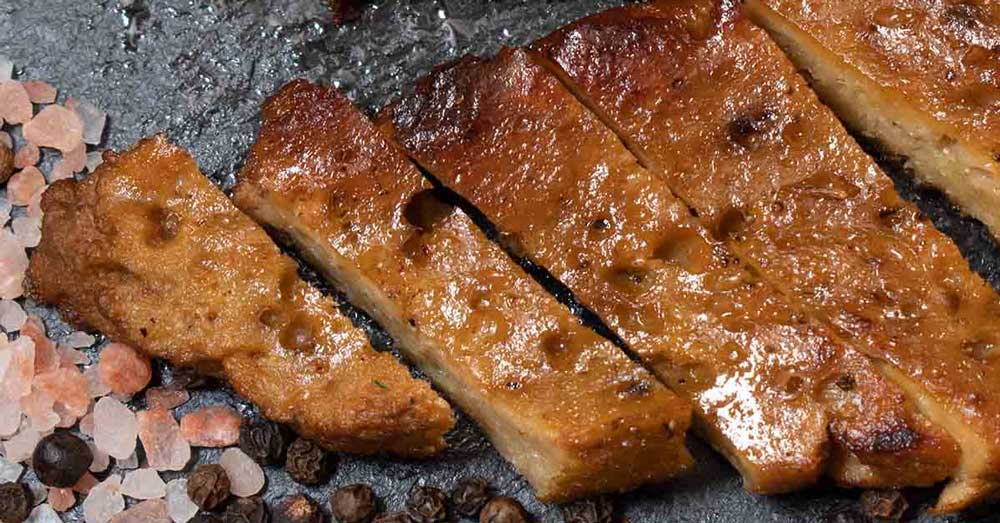Seitan Protein per 100g
If you’re exploring plant-based protein options or following a vegan or vegetarian lifestyle, you’ve likely come across seitan. Often referred to as “wheat meat,” seitan is a popular meat substitute due to its impressive protein content and versatility in cooking.
We’ll dive into the protein content of seitan per 100g, explore its health benefits, and explain why it’s considered one of the best plant-based protein sources.
Plus, we’ll share some delicious ways to incorporate seitan into your meals.
What is Seitan?
Seitan is a plant-based food made from gluten, the protein found in wheat. It’s created by washing wheat flour dough with water to remove the starch, leaving behind the sticky, elastic gluten.
The result is a dense, chewy protein-packed food that can be flavored and cooked in many ways, mimicking the texture of meat.
Because seitan is so rich in protein and has a texture similar to meat, it's a popular choice for vegetarians, vegans, and anyone looking to reduce their meat consumption.
It's available in various forms: from pre-cooked seitan in stores to homemade versions that can be customized with spices and marinades.
How Much Protein Does Seitan Contain?
Seitan contains about 25g of protein per 100g, making it an excellent plant-based protein source, ideal for vegetarians and vegans looking to boost protein intake.
This makes it a fantastic alternative to meat, which is why it’s commonly used in vegan and vegetarian recipes that mimic the texture and taste of meat.
For comparison, seitan offers more protein per 100g than other popular plant-based sources like tofu (around 8g per 100g) and tempeh (around 19g per 100g), making it an excellent option for anyone looking to increase their protein intake.
Why is Seitan a Great Source of Protein?
Here’s why seitan stands out as a great source of plant-based protein:
1. High Protein Content
As mentioned, seitan delivers an impressive 25g of protein per 100g, which is more than some animal-based proteins.
If you're looking to increase your protein intake, especially in a plant-based diet, seitan should definitely be on your radar.
2. Low in Fat
Seitan is naturally low in fat, with around 2g of fat per 100g. This makes it an excellent choice for those looking to reduce their fat intake while still enjoying a protein-rich food.
3. Versatile in Cooking
Seitan’s texture is remarkably similar to meat, making it incredibly versatile in recipes.
It can be grilled, sautéed, stir-fried, or even used in stews, curries, or sandwiches. It easily absorbs flavors from spices, sauces, and marinades, making it perfect for any dish where you would typically use meat.
4. Rich in Iron
In addition to protein, seitan is a good source of iron, an essential mineral that supports the body’s production of hemoglobin, helping to carry oxygen in the blood.
Iron is especially important for vegetarians and vegans, who may find it harder to get enough iron from plant-based foods alone.
5. Easy to Digest
Because seitan is made from gluten, it’s relatively easy to digest for most people. However, individuals with gluten sensitivities or celiac disease should avoid seitan, as it is not gluten-free.
Health Benefits of Seitan
Aside from being a great source of protein, seitan offers several other health benefits:
1. Muscle Repair and Growth
The protein in seitan is essential for muscle recovery and growth. If you’re working out regularly or trying to build muscle, seitan can be an excellent addition to your diet to help repair muscle fibers and stimulate muscle growth.
2. Supports a Healthy Immune System
Seitan contains amino acids that are important for producing antibodies, which help maintain a healthy immune system. It can also support tissue repair and hormone production.
3. Weight Management
Since seitan is low in fat and high in protein, it can help keep you feeling full and satisfied, reducing overall calorie intake and supporting weight management. Protein is known to increase feelings of fullness and prevent overeating.
4. Heart Health
With its low fat content and the presence of iron, seitan can also support cardiovascular health by promoting healthy blood circulation and reducing the risk of iron deficiency anemia.
How to Incorporate Seitan into Your Diet
Seitan’s versatility makes it easy to include in a wide variety of dishes. Here are some ideas for incorporating seitan into your meals:
1. Seitan Stir-Fry
Cut seitan into strips and stir-fry with your favorite vegetables like bell peppers, onions, and broccoli. Add soy sauce, garlic, and ginger for a quick, protein-packed meal.
2. Seitan Tacos
Season seitan with taco spices like cumin, chili powder, and paprika. Sauté it with onions and peppers, then serve in soft tortillas with salsa, avocado, and lettuce.
3. Seitan Sandwiches or Wraps
Use seitan as a substitute for deli meats in sandwiches or wraps. Add some hummus, greens, and your favorite veggies for a hearty and filling meal.
4. Seitan Stew or Curry
Add seitan to your favorite stews or curries as a meat substitute. It absorbs flavors beautifully, making it a perfect addition to rich, savory dishes.
5. Seitan Skewers
Marinate seitan cubes in your favorite marinade, then skewer and grill them for a delicious, meat-free alternative to grilled meats.
Is Seitan Right for You?
While seitan is an excellent source of protein, it’s important to note that it’s made from gluten. This means it is not suitable for individuals with gluten sensitivities or celiac disease.
For those without gluten issues, seitan is a fantastic, high-protein addition to your diet.
Conclusion:
If you’re looking to boost your plant-based protein intake, seitan is a game-changer. With 25g of protein per 100g, it stands out as one of the best plant-based protein sources available.
Its low fat content, versatility in cooking, and ability to mimic meat make it an excellent choice for vegans, vegetarians, and anyone looking to reduce their meat consumption.
So, whether you’re using it in stir-fries, curries, or sandwiches, seitan is a delicious and nutritious way to meet your protein needs.
Image Credit: https://www.crazyvegankitchen.com/


